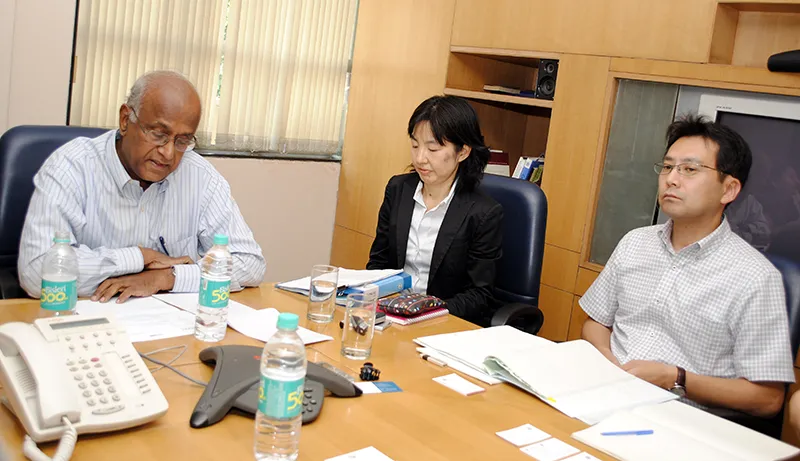Japan's Prime Minister Shinzo Abe believes that his country needs quicker and more decisive responses to China's increasing maritime ambitions in waters near Japan, according to two Japanese security experts, Dr Marie Izuyama and Dr Hikaru Yamashita.

Japan’s Prime Minister Shinzo Abe believes that his country needs quicker and more decisive responses to China’s increasing maritime ambitions in waters near Japan, according to two Japanese security experts, Dr Marie Izuyama and Dr Hikaru Yamashita.
Participating in an interaction at ORF Delhi on 24 September, the experts said the Prime Minister also believes that there should be effective coordination amongst the ministry of foreign affairs, ministry of defence and the three arms of the defence forces, including the coast guards.
Dr Marie Izuyama and Dr Hikaru Yamashita explained the prevailing strategic situation in north
east Asia and the reforms that are being proposed to modify Japanese security posture.
At the outset, Dr Izuyama gave a detailed account of the security environment surrounding Japan and noted that developments like North Korean missile launch (9th April and December 2012), China’s increasing maritime activity and the Algerian hostage crises (Jan 2013) have aroused serious concerns in Japan.
Dr Izuyama said the Algerian crisis was seen as a major lapse in Japanese security as ten Japanese businessmen had lost their lives in the crises and this put more pressure on Japan’s security agencies to act more effectively. The idea of non combatant evacuation was also introduced around this period which is usually carried out as an operation conducted to evacuate civilians from another country, generally due to deteriorating security situation.
Dr Izuyama noted that though the government has a right under the constitution to collective self defense, it has chosen not to exercise it. However, Prime Minister Abe has had a long term agenda for getting this interpretation modified. Even as early as 2007 at the time of his first prime ministerial tenure, he had set up an advisory council to reduce restrictions on collective self defence. But since he had to resign in 2007, he could not implement his ideas on collective self defence.
After assuming office again in December 2012, the Prime Minister reviewed his earlier plans for the setting up of the advisory council. This time around, it is called the National Security Council. The Japanese cabinet approved the National Security Council Bill on June 6, 2013. And the ’Council on Security and Defense Capabilities’ met in September to frame the national security strategy document, said Dr Izuyama.
Dr Izuyama said the council’s main job will be to respond to foreign security issues more swiftly, strengthen the political leadership with the PMO at the centre, establish a permanent post of national security advisor who will directly assist the prime minister, set up a national security bureau in the cabinet secretariat which will support the NSC in planning and coordinating foreign and defence planning, advise on the matter of emergency responses and order intelligence community to submit information.
According to Dr Izuyama, the major changes that have taken place are that ’Security Council’ has been restructured into the ’National Security Council’ and it has become a decision making body from an advisory body. The council has also trimmed down the number of ministers from nine to four. However, the Japanese government, she said, does not have a clear picture on the position of the national security whereas in India this position is quite strong .
Mr Yamashita spoke about the Japanese peace keeping operations. Japan’s peace keeping and other peace cooperation activities are "primary" SDF missions undertaken by the nation. For disaster relief, Japan has the "law concerning the dispatch of international disaster relief teams (revised in 1992) under which the country has launched operations in Honduras, Indonesia, India, Pakistan, Iran, Thailand and Turkey. Japan security forces also did election monitoring in Bosnia, Kosovo, Timor Leste, DRC and Nepal. Japan also undertook the anti terrorist operation in Indian Ocean under the "Anti terrorism Special Measures Law 2001 and Replenishment Support Special Measures Law (ATSML, RSSML(2008) . It also provided reconstruction assistance to Iraq in "Iraq Special Measures Law" (2003).
Some more recent developments in Japanese security structure has been the MSDF anti-piracy operations (Somalia, 2009), Japan Peacekeeping Training and Research Centre (2010), UN certified training courses at operational level (CCC, SOC), financial assistance to Africa and Malaysia. Current peacekeeping has been very robust. There are limits to the use of force in these peacekeeping operations due to Article nine of the Japanese constitution, pointed out Mr Yamashita.
He said there has been a slight increase in Japan’s annual military budget. He also mentioned about the noteworthy cooperation that took place among India, Japan and China for conducting anti piracy operations and that there is a solid basis for cooperation between Asian countries in case a natural disaster takes place. Japan is likely to continue with its peacekeeping operations in the near future as well, Mr Yamashita said.
(This report is prepared by Ateetmani Brar, Research Intern, Observer Research Foundation, Delhi)
The views expressed above belong to the author(s). ORF research and analyses now available on Telegram! Click here to access our curated content — blogs, longforms and interviews.
